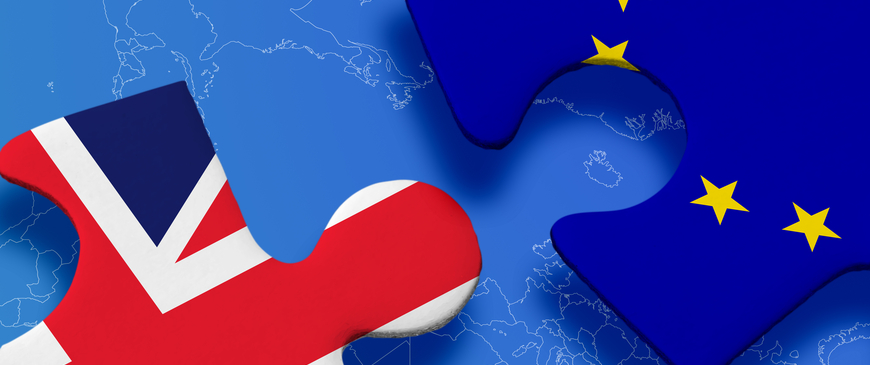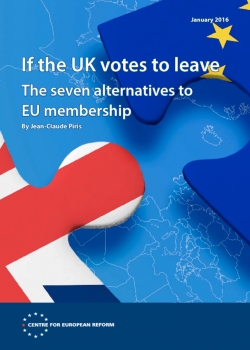
If the UK votes to leave: The seven alternatives to EU membership
- The United Kingdom might vote to leave the EU in the forthcoming referendum. But the British people may be voting without any clear sense of the alternatives to EU membership. This policy brief considers the various options. An overarching theme is that, if the UK wants access to the single market when it has left the EU, it will have to accept three things: continued budget contributions, continued free movement of labour, and continued supremacy of EU law over British law in the single market.
- Some British eurosceptics believe that Britain could negotiate a special status of ‘half-membership’, whereby the UK would remain a full, voting member of the single market, but ditch most other EU policies. However, this would require the existing treaties – which allow no such special status – to be revised, which is not a viable possibility at the moment. In any case, most member-states and the EU institutions believe that allowing such a status for Britain could provoke similar requests from others, possibly leading the entire Union to unravel. So half-membership is not an option.
- After a vote to leave, the UK must invoke Article 50 of the Treaty on European Union, which could lead to several alternatives to membership. One simple option would be for Britain to join the European Economic Area (EEA) – the ‘Norwegian’ option. Britain would then be outside the common agricultural and fisheries policies. But its economic relationship with the EU would not change significantly: it would pay nearly as much into the budget as it does today, free movement of labour would continue, and the UK would have to apply the single market’s rules and regulations without having a vote on them.
- Most other options would involve the negotiation of a withdrawal treaty between the UK and the EU. One possibility would be a withdrawal treaty leading to a customised relationship. The best possible outcome for the British, under this option, would be something akin to the Norwegian option but without EEA membership. Britain would gain as much access to the single market as it was prepared to accept EU rules, without having a vote on them; to make payments into the EU budget; and to tolerate free movement of labour.
- The Swiss option is unlikely to be on offer from the EU. Switzerland has negotiated a series of bilateral agreements with the EU. The country is part of the single market for goods, but not services. A similar status for Britain would be highly costly for the City of London. But the EU is very unhappy with the relationship, because it has to negotiate constantly with the Swiss to make sure that their rules are equivalent to the EU’s evolving acquis communautaire. And since the Swiss voted to impose quotas on immigration from the EU in 2014, the EU has demanded a new agreement which would make Switzerland automatically update its rules to match those of the EU, as well as accept the jurisdiction of the European Court of Justice.
- Britain could join the EU’s customs union, like Turkey – accepting the EU’s external tariffs without having a say on the setting of those tariffs. The UK would then not face tariffs in exporting to the EU, and it would have access to the single market in goods, in exchange for signing up to all the relevant EU rules. But it would not have access to services markets and Turkey, like Switzerland and Norway, does not benefit from the free trade agreements (FTAs) that the EU negotiates with other parts of the world.
- A free trade agreement is one of the more likely options, but the main benefit of most FTAs is merely tariffs that are lower than those prescribed by World Trade Organisation (WTO) rules. Most FTAs do not cover services, regulatory convergence or public procurement. If Britain sought to negotiate a more substantive FTA than any existing template – giving it good access to the EU’s single market – the other member-states would insist on mechanisms for ensuring that it automatically adopted new EU rules, and for policing the agreement. They would also demand payments into the EU budget and free movement of labour.
- Britain could simply trade with the EU under WTO rules. The WTO sets upper limits on the tariffs that countries can impose. So British exports to the EU would be subject to the EU’s common external tariff. And the WTO has made little progress in freeing up services, which would restrict the City of London’s access to the EU market. British exporters to the EU would also face the same non-tariff barriers that most non-EU countries, like Russia and China, have to put up with. As for trading with the rest of the world, the UK would no longer enjoy the benefits of the 60-odd FTAs that the EU has negotiated with other countries. The British would have to negotiate new agreements from scratch; but in doing so – as with any other FTA that the UK pursued – they would have much less clout than the EU as a whole.
- Withdrawal would create enormous legal headaches for EU companies and individuals currently in Britain, and for British ones elsewhere in the EU. After the repeal of the European Communities Act of 1972, the British government would have to hurry to draft new laws covering farming, fishing, competition policy, regional aid, environmental standards and much else, to avoid a regulatory vacuum. To the extent that the UK retained any access to the single market, the government would also need a mechanism for adopting new EU regulations and directives as they emerged. British citizens and companies in other member-states would lose rights derived from EU law. The British government would need to negotiate an accord with the rest of the EU on reciprocal rights. If, as is likely, a post-Brexit government made it harder for EU citizens to live, work or study in the UK, Britons wishing to remain in or move to the continent would face similar problems.
Copyright is held by the Centre for European Reform. You may not copy, reproduce, republish or circulate in any way the content from this publication except for your own personal and non-commercial use. Any other use requires the prior written permission of the Centre for European Reform.

